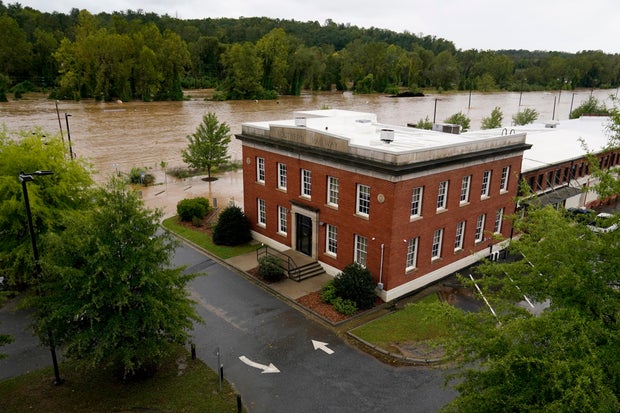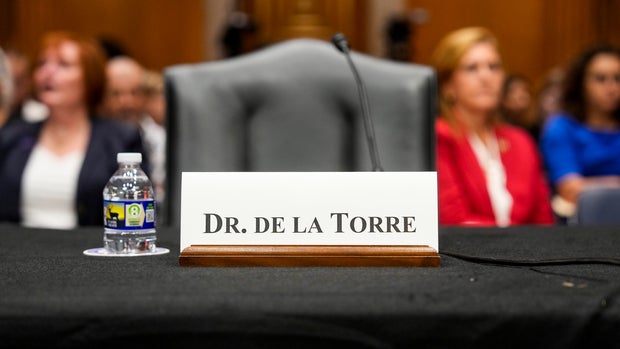CBS News
What home equity borrowing option makes sense with inflation dropping? Experts weigh in

Adrian Calinescu/Getty Images
The economy continues to significantly impact borrowing rates. For example, over the last year or so, stubborn inflation, geopolitical conflicts and other factors have kept interest rates elevated. Consequently, the Federal Reserve continues to take a cautious stance on interest rate cuts to control inflation.
The ongoing inflationary issues and high interest rates are contributing to elevated home equity loan rates. Even so, home equity loans typically have lower rates than other financing options like credit cards and personal loans. According to current data from the Federal Reserve, credit card and 24-month personal loan interest rates average 22.63% and 12.49%, respectively. Meanwhile, the average home equity loan interest rate is currently 8.60% (as of June 25, 2024).
The most recent inflation report shows that consumer prices rose 3.3% in May compared to the year prior. That rate, while high, is still slightly lower than April’s 3.4% inflation rate — and it could, in turn, have an impact on home equity loan rates. As such, we consulted several mortgage loan experts to review different borrowing options and determine which ones may make sense with inflation cooling.
Find out more about how the right home equity borrowing option could benefit you today.
What home equity borrowing option makes sense with inflation dropping? Experts weigh in
Here’s what experts have to say about the best home equity loan borrowing option now that inflation is cooling:
Home equity loans
Home equity loans may be a good option if you’re looking to access equity as cash to consolidate debt, address an emergency or pay for a major home renovation.
“In a low interest rate environment, which could occur soon if inflation cools and the Fed lowers rates, a home equity loan or cash-out refinance could make the most sense,” says Michael Collins, founder and CEO at WinCap Financial. “A home equity loan is often taken as a lump sum that has a fixed interest rate, making it a good option for those who want to have monthly payments that are predictable.”
“Home equity loans are secured by a lien on your property and can go behind a first mortgage lien. They are popular because they do not require you to refinance your first mortgage, which is especially important if you are content with your current interest rate and payment,” Ali Nassirian, vice president of consumer and home lending at Travis Credit Union, notes.
In the current rate environment, you may want to reduce your payment with a longer term.
“Equity loans can have longer terms. There are scenarios where they go to 20 to 30 years on equity loans so you can stretch the payment out,” says Nassirian.
Be aware, though, that longer loan terms will typically result in lower monthly payments but could cost more in overall interest over the life of the loan.
Compare today’s top rates on home equity borrowing options here.
Home equity lines of credit
Unlike home equity loans, which distribute your funds in one lump sum, home equity lines of credit (HELOCs) work more like a credit card. You can borrow when you need it for as much as you want up to your limit and only pay interest on the amount you borrow. HELOCs can be a good option when you need flexible access to funds for ongoing expenses or projects.
HELOCs typically come with a variable interest rate, which could work in your favor if interest rates fall.
“If your expectation is that the worst of inflation is over, getting an adjustable rate HELOC would be your best option. As soon as you hear that the Fed has lowered rates, your rate — if tied to the prime (rate) — will come down right away [by] that same amount. Your cost of borrowing will be dropping every time the Fed lowers rates and you will not have to lift a finger,” Craig Garcia, president at Capital Partners Mortgage, says.
“A home equity loan that has amortizing payments was a smart move when rates were low, and you could take advantage of the fact that the rate is fixed with this type of product. As we enter the Fed’s rate-cutting cycle, a HELOC makes more sense as you will be able to benefit with a lower monthly payment as rates go down,” Sarah Alvarez, vice president of mortgage banking at William Raveis Mortgage, says.
Cash-out refinance loans
A cash-out refinance doesn’t make sense for most homeowners right now. This type of loan replaces your original mortgage with a new, larger one and allows you to pocket the difference as cash, but in today’s rate environment, most homeowners already have a lower rate than today’s average.
According to a 2023 Reffin study, nearly 92% of homeowners have mortgage rates below 6%. Meanwhile, the average mortgage rate on a 30-year fixed-rate mortgage is 7.00% as of June 25, 2024. And, in recent years, homeowners haven’t wanted to sacrifice their low-rate mortgages — some with rates in the 3% and 4% range obtained during the pandemic — for higher-rate ones.
But while refinancing at a lower rate isn’t possible for most homeowners, it may be a good option in some scenarios. For example, if you have an older mortgage with a high rate or a more recent mortgage obtained during this period of elevated rates, refinancing may help you secure a lower interest rate and save money.
“As rates come down, we will see many people choose just to do a cash-out refinance in order to lock in a better long-term fixed rate,” says Alvarez. “People also use cash-out refinances to make changes to how the title is held or who is on the mortgage.”
The bottom line
No matter what borrowing option you’re considering, the most important priority is to make sure you can comfortably afford the payments and understand all the loan’s terms. And as with any financial product, consider the pros and cons of using home equity before proceeding.
If you’re considering a variable rate for a long-term loan, remember that while rates are currently dropping, they can also increase at any time and impact your future payments. If you’re unsure what borrowing option may serve you best, consider consulting your financial advisor.
CBS News
North Carolina’s Asheville devastated after Helene’s damage cuts power, floods roads

Floodwaters pushed by the remnants of Hurricane Helene left North Carolina’s largest mountain city largely cut off Saturday by damaged roads and a lack of power and cellphone service, part of a swath of destruction across southern Appalachia that left an unknown number dead and countless worried relatives unable to reach loved ones.
In North Carolina alone, more than 400 roads remained closed on Saturday as floodwaters began to recede and reveal the extent of damage. North Carolina Gov. Roy Cooper said that supplies were being airlifted to that part of the state. Cooper said two people died in his state, Helene killed at least 52 people across multiple states.
Among those rescued from rising waters was nurse Janetta Barfield, whose car was swamped on Friday morning as she left an overnight shift at Asheville’s Mission Hospital. She said she watched a car in front of her drive through standing water and thought it was safe to proceed. But her car stalled, and within minutes water had filled her front seat up to her chest. A nearby police officer who saw her car stall helped her to safety.
“It was unbelievable how fast that creek got just in like five minutes,” Barfield said.
Erik Verduzco / AP
Early on Saturday morning, many gas stations were closed because they didn’t have electricity, and the few that were open had hourlong lines wrapped around the block. The hub of tourism and arts, home to about 94,000 people, was unusually still after floodwaters swamped neighborhoods known for drawing visitors including Biltmore Village and the River Arts District, which is home to numerous galleries, shops and breweries.
More than 700,000 power customers were without power across North Carolina, including 160,000 in Buncombe County. Interstate 40 and I-26 were impassible in multiple locations, and a state transportation department map showed that most routes into Asheville and across much of the mountains were snarled. North Carolina’s Department of Transportation posted on social media on Saturday afternoon that “all roads in Western North Carolina should be considered closed.”
In Asheville, there was no cellular service and no timeline for when it would be restored.
“We have had some loss of life,” County Emergency Services Director Van Taylor Jones told reporters. However, he said they were not ready to report any specifics. Officials have been hindered in contacting next of kin by the communications outages. Asheville police instituted a curfew from 7:30 p.m. Friday to 7:30 a.m. Saturday.
“The curfew is to ensure the public’s safety and will be in effect until further notice,” police said.
Asheville transit services were also suspended, police said. The city advised residents to boil “all water used for human consumption,” as there was at least one significant water line break during the storm. Many residents might not be getting water or reduced or no pressure water.
Jones said the area experienced a cascade of emergencies that included heavy rain, high winds and mudslides. Officials said they tried to prepare for the storm but its magnitude was beyond what they could have imagined.
“It’s not that we (were) not prepared, but this is going to another level,” Sheriff Quentin Miller said. “To say this caught us off-guard would be an understatement.”
Erik Verduzco / AP
Atlanta resident Francine Cavanaugh said she has been unable to reach her sister, son, or friends in the Asheville area.
“My sister checked in with me yesterday morning to find out how I was in Atlanta,” she said on Saturday. “The storm was just hitting her in Asheville, and she said it sounded really scary outside.”
Cavanaugh said her sister had no idea how bad the storm would be there. She told Cavanaugh she was going to head out to check on guests at a vacation cabin “and that’s the last I heard of her. I’ve been texting everyone that I know with no response. All phone calls go directly to voicemail.”
CBS News
Embattled Steward Health Care CEO Ralph de la Torre to resign

The CEO of a hospital operator that filed for bankruptcy protection in May will step down after failing to testify before a U.S. Senate panel.
Steward Health Care CEO Ralph de la Torre has overseen a network of some 30 hospitals around the country. The Texas-based company’s troubled recent history has drawn scrutiny from elected officials in New England, where some of its hospitals are located.
A spokesperson for de la Torre told the Associated Press Saturday that he “has amicably separated from Steward on mutually agreeable terms” and “will continue to be a tireless advocate for the improvement of reimbursement rates for the underprivileged patient population.”
A CBS News investigation that spanned nearly two years documented how private equity investors and de la Torre extracted hundreds of millions of dollars while healthcare workers and patients struggled to get the life-saving supplies they needed.
In August, the company closed two Massachusetts hospitals, leaving about 1,200 workers jobless, according to the state.
Sen. Bernie Sanders of Vermont, who chairs the Senate Health, Education, Labor and Pensions Committee, said earlier this month that Congress “will hold Dr. de la Torre accountable for his greed and for the damage he has caused to hospitals and patients throughout America.”
De la Torre’s resignation is effective Oct. 1. The Senate approved a resolution on Wednesday that was intended to hold him in criminal contempt for failing to testify before a committee.
The Senate panel has been looking into Steward’s bankruptcy. De la Torre did not appear before it despite being issued a subpoena. The resolution refers the matter to a federal prosecutor.
Kayla Bartkowski/The Boston Globe via Getty Images
CBS News
Climate Watch: Protecting the Planet | How climate change threatens plant and animal species

Watch CBS News
Be the first to know
Get browser notifications for breaking news, live events, and exclusive reporting.





